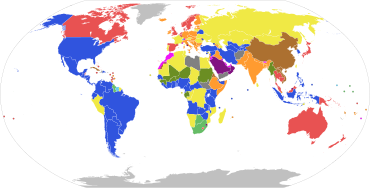| Part of the Politics series |
| Republicanism |
|---|
|
|
A parliamentary republic is a republic that operates under a parliamentary system of government where the executive branch (the government) derives its legitimacy from and is accountable to the legislature (the parliament). There are a number of variations of parliamentary republics. Most have a clear differentiation between the head of government and the head of state, with the head of government holding real power and the head of state being a ceremonial position, similar to constitutional monarchies. In some countries the head of state has reserve powers to use at their discretion as a non-partisan "referee" of the political process.[1][2] Some have combined the roles of head of state and head of government, much like presidential systems, but with a dependency upon parliamentary confidence.

Parliamentary systems: Head of government is elected or nominated by and accountable to the legislature
Presidential system: Head of government (president) is popularly elected and independent of the legislature
Hybrid systems:
Other systems:
Note: this chart represents the de jure systems of government, not the de facto degree of democracy.
- ^ Twomey, Anne. "Australian politics explainer: Gough Whitlam's dismissal as prime minister". The Conversation. Retrieved 18 October 2018.
- ^ "The President's Role". The Times of India. Retrieved 18 October 2018.